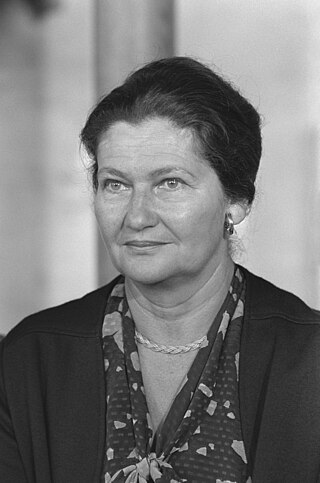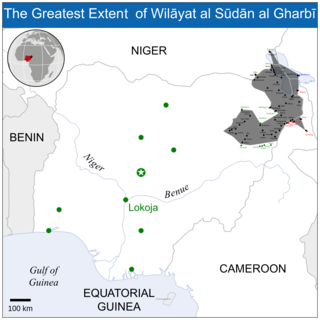
Cameroon, officially the Republic of Cameroon, is a country in Central Africa. It shares boundaries with Nigeria to the west and north, Chad to the northeast, the Central African Republic to the east, and Equatorial Guinea, Gabon and the Republic of the Congo to the south. Its coastline lies on the Bight of Biafra, part of the Gulf of Guinea and the Atlantic Ocean. Due to its strategic position at the crossroads between West Africa and Central Africa, it has been categorized as being in both camps. Its nearly 27 million people speak 250 native languages, in addition to the national tongues of English and French, or both.

Simone Veil was a French magistrate, Holocaust survivor, and politician who served as Health Minister in several governments and was President of the European Parliament from 1979 to 1982, the first woman to hold that office. As health minister, she is best remembered for advancing women's rights in France, in particular for the 1975 law that legalized abortion, today known as the Veil Act. From 1998 to 2007, she was a member of the Constitutional Council, France’s highest legal authority.

Boko Haram, officially known as Jamā'at Ahl as-Sunnah lid-Da'wah wa'l-Jihād, is an Islamist jihadist organization based in northeastern Nigeria, which is also active in Chad, Niger, northern Cameroon, and Mali. In 2016, the group split, resulting in the emergence of a hostile faction known as the Islamic State's West Africa Province.
Fotokol is a town and commune in Logone-et-Chari Department, Far North Region, Cameroon. It is home to Fotokol High School.
Kolofata is a town and commune in Cameroon.

The Boko Haram insurgency began in July 2009, when the militant Islamist and jihadist rebel group Boko Haram started an armed rebellion against the government of Nigeria. The conflict is taking place within the context of long-standing issues of religious violence between Nigeria's Muslim and Christian communities, and the insurgents' ultimate aim is to establish an Islamic state in the region.
Timeline of the Boko Haram insurgency is the chronology of the Boko Haram insurgency, an ongoing armed conflict between Nigerian Islamist group Boko Haram and the Nigerian government. Boko Haram have carried out many attacks against the military, police and civilians since 2009, mostly in Nigeria. The low-intensity conflict is centred on Borno State. It peaked in the mid-2010s, when Boko Haram extended their insurgency into Cameroon, Chad and Niger.

On the night of 14–15 April 2014, 276 mostly Christian female students aged from 16 to 18 were kidnapped by the Islamic terrorist group Boko Haram from the Government Girls Secondary School at the town of Chibok in Borno State, Nigeria. Prior to the raid, the school had been closed for four weeks due to deteriorating security conditions, but the girls were in attendance in order to take final exams in physics.
As of 31 August 2020, Cameroon hosted a total refugee population of approximately 421,700. Of these, 280,500 were from the Central African Republic, driven by war and insecurity. In the Far North Region, Cameroon hosts 114,300 Nigerian refugees, with the population sharing their already scarce resources with the refugees.
Nigerian refugees are persons originating from the country of Nigeria, but seeking refuge outside the borders of their native country. Nigeria has a refugee crisis which has extended for almost a decade, mainly due to the insurgency in Northern Nigeria by the Boko Haram.
Religious violence in Nigeria refers to Christian-Muslim strife in modern Nigeria, which can be traced back to 1953. Today, religious violence in Nigeria is dominated by the Boko Haram insurgency, which aims to establish an Islamic state in Nigeria. Since the turn of the 21st century, 62,000 Nigerian Christians have been killed by the terrorist group Boko Haram, Fulani herdsmen and other groups. The killings have been referred to as a silent genocide.
The December 2014 Cameroon clashes were a number of incidents that occurred between 28–29 December 2014 in variety of locations in Cameroon's Far North Region. The event included attacks on civilians and military positions carried out by Nigeria-based Boko Haram; the attacks were followed by a successful Cameroonian military counter offensive.
The January 2015 raid on Kolofata was an unsuccessful assault on a Cameroonian military base at Kolofata, Far North Region, perpetrated by Boko Haram. The incident occurred on 12 January 2015 coming shortly after another Boko Haram incursion onto Cameroonian soil.

Starting in late January 2015, a coalition of West African troops launched an offensive against the Boko Haram insurgents in Nigeria.
The Rapid Intervention Battalion is an elite military force and an army combat unit of the Cameroonian Armed Forces.
Halima Yakoy Adam is a Chadian paralegal. Drugged and strapped to an explosive device, she was forced into a crowded market in Bol, Chad on 22 December 2015. She lost two legs, but survived. After rehabilitation, she studied to become a paralegal. After that, she has worked to help other women survivors of violence in Chad.
Divina Stella Maloum is an activist from Cameroon. She is the founder of Children for Peace (C4P) in Cameroon. She set up the organisation when she was 11 or 12 years old. She was inspired by children who were exploited, child marriages and child soldiers. She uses cartoons to communicate with children to avoid language barriers. She is a changemaker for peace. On November 20, 2019 - World Children's Day, when she was 14, she was joint winner of the International Children's Peace Prize together with Greta Thunberg. She was one of 137 applicants from 56 countries. The winners were announced by Desmond Tutu and the award was presented by Nobel Peace Prize recipient Kailash Satyarthi in a ceremony at The Hague. The prize was 100,000 euros to be spent on their cause.
Events in the year 2022 in Cameroon.
Le spectre de Boko Haram is a 2023 Cameroonian documentary film written and directed by Cyrielle Raingou on her feature film directorial debut. The film had its world premiere at the 2023 International Film Festival Rotterdam. The film also won the Tiger Award at the 52nd edition of the International Film Festival Rotterdam. The film showcases the harsh reality of daily struggles of Cameroonian people who have to deal with the inhumane and barbaric acts of terrorist organisation Boko Haram.
Marthe Wandou is a Cameroonian lawyer and women's rights activist.





